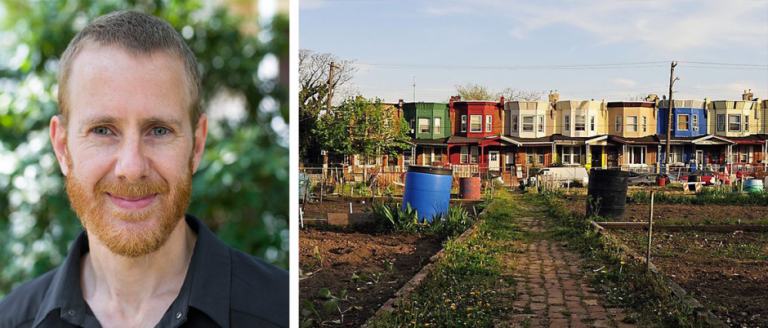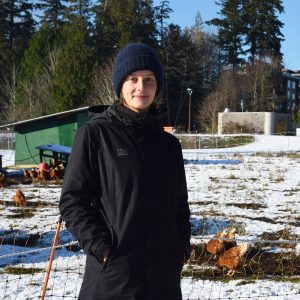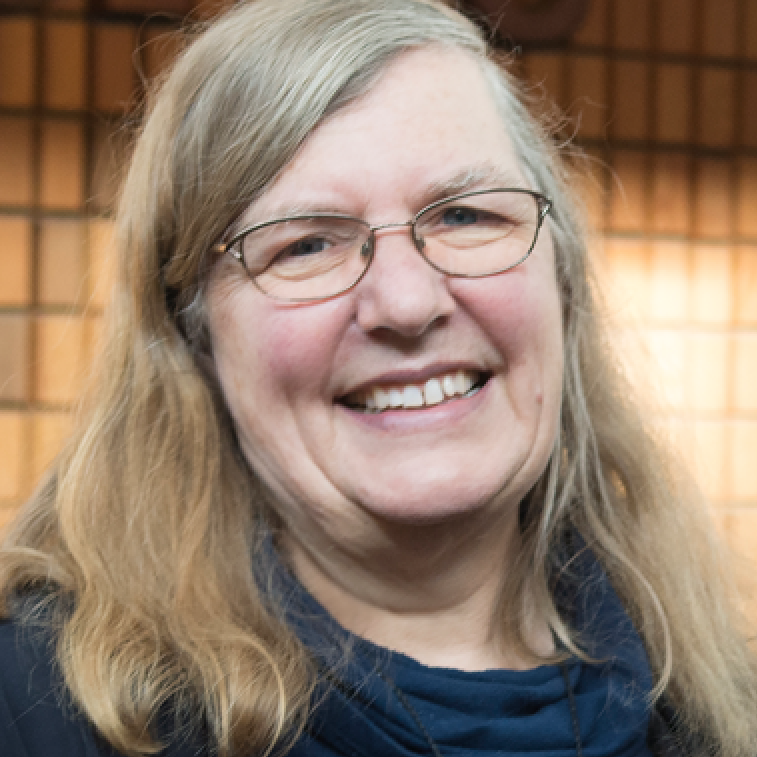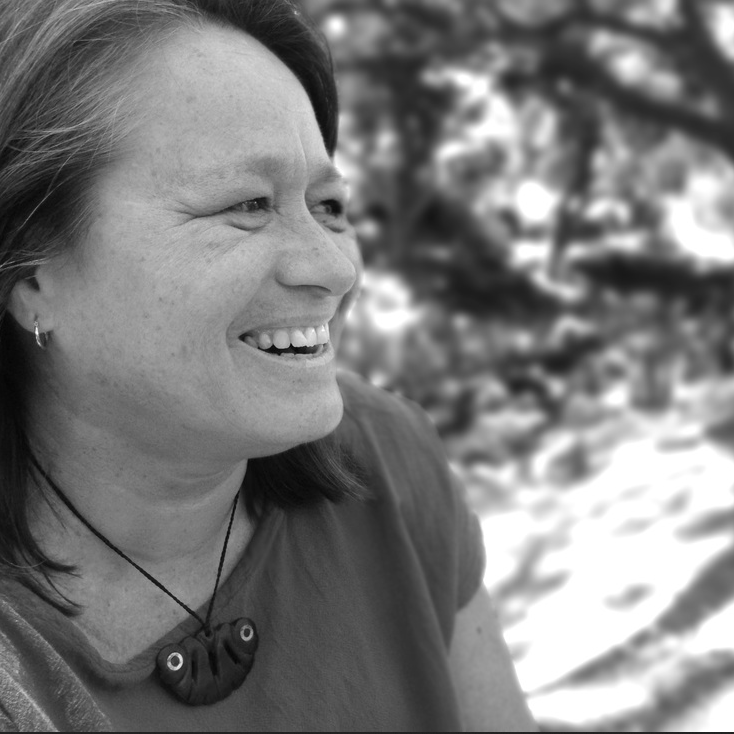Feb. 17: Mapping Community Gardens in Philadelphia with Dr. Craig Borowiak
February 17, 2017, 12:00 p.m. – 1:30 p.m. Aquatic Ecosystems Research Laboratory.

About the Talk:
The first hour of this event will feature a talk by Dr. Craig Borowiak on how urban agriculture fits within larger solidarity economies and post-capitalist politics in the U.S. It will include findings from an initiative to create a comprehensive inventory of community gardens in Philadelphia and to map them against racial and class variables as well as land-ownership patterns.
Following the talk, from 1:00-1:30 pm, the Food Systems Research Network will host their kick-off event. Lunch will be provided at 1:00 pm for Food Systems Research Network participants.
About the Speaker:
Craig Borowiak (PhD, Duke University) is an associate professor of Political Science at Haverford College. His research and teaching revolve around political economic thought, globalization, democratic theory, global civil society, and post-capitalist politics. He is currently researching solidarity economies and the spread of solidarity economy movements worldwide. This includes extensive qualitative, quantitative and spatial research in Philadelphia, where he is based. He has developed a spatial database of over 800 solidarity economy entities in the city, including over 470 community gardens, which he has been mapping against demographic and land ownership data. He is also the creator of a web-based national mapping platform for the solidarity economy (www.solidarityeconomy.us) which maps over 25,000 entities across the US.
His earlier research focused on democratic accountability, farmers’ rights, and citizens tribunals, among other topics. He is the author of Accountability and Democracy: the Pitfalls and Promise of Popular Control (Oxford University Press, 2011), and co-editor of Exploring Cooperatives: Economic Democracy and Community Development in Pennsylvania and Wisconsin (Madison, WI: University of Wisconsin-Ext, 2016). He has published several articles in major political science journals, including Polity, the Journal of Politics, Political Theory, New Political Science, and Politics and Society, among others.
LFS 496 Student Profile: Sigbrit Jaccard Søchting
By justin lee on February 10, 2017
LFS 496 Student Profile: Sigbrit Jaccard Søchting

Work Placement: Biodiversity and Perennial Crops
Supervisor: Mel Sylvestre
I am a 5th year student in the Global Resource Systems program in the Faculty of Land and Food Systems with a specialization in Global Health. For me, global health is unfortunately a very economic and political issue. Helping to achieve equity in health for all people worldwide is one of my goals and I want to achieve that not only through medicine or food but by encompassing political, economic and social aspects of well-being as well.
Interning at UBC Farm showed me how food and sustainability are integral to good health which made me see the UBC Farm as a home of solutions for local challenges that can eventually lead to global changes.
What was your work placement about?
Through my internship, I had the chance to work on many different tasks. I worked with various projects encompassing all aspects of perennial crops and herbs (strawberries, blueberries, flower fields, hop yard, herb garden, etc). We also did research trials looking at which crops grew best, so growing different varieties of crops to see which ones had the best outcomes, all to help farmers across BC.
The Seed Saving Project was one of the tasks that I could label as my own role. The Seed Saving Project involves seed germination tests to determine the viability of the seeds that UBC Farm sells. In two months, I was able to learn and take on the project with minimal supervision. Having one large focus allowed me to improve significantly in that part of the discipline. However, taking on other smaller tasks enabled me to become familiar with all aspects in a broader way. It is good to have a focus, like a particular project to hand in at the end of the internship, but at the same time I liked helping with whichever project was happening that day. It was nice to get to know every little piece of the whole system.
What was something that surprised you the most during your work placement?
The most surprising aspect of my internship was finding out how everyone came from different backgrounds. I first pictured the Farm as everyone being an expert farmer, but as I encountered many students, researchers, and other members of CSFS throughout my internship, I saw how they all had their own stories and came from different angles and different lenses.
I see the farm as a very inclusive environment that allows everyone to be involved in some way. Interns or newly graduates may tend to look for jobs that fit their qualifications perfectly, but the Farm is a place for learning and improvements and you don’t necessarily need any specific expertise. You could know nothing and still be able to help and be a part of it.
What intrigues you about the food system?
The linkage between food and urbanization is an intriguing concept for me and it is why I find the UBC Farm quite interesting. I like how the Farm embodies this intersection and is able to bridge these two concepts fully. It is hard to envision a good food system and there are a lot of things that are not going so right. UBC Farm shows us a path to know what we need to work on and how we can have good food systems in cities. My interest in urban farming is what led me to apply for this internship as well as to gain hands-on farming experience.What inspires you?
I am inspired by reading about different places and times. It is how I connect and learn to think about the world. Interning at the Farm gave me a chance to appreciate the importance of learning once again. You never are done learning and especially with farming and food. There is so much you don’t know, like different ways of farming, different cultures and techniques. And it’s constantly growing.
I viewed my supervisor, Mel Sylvestre, as an expert throughout my internship but even Mel feels that there is so much to learn and never an end to it. Being part of a community that grows every day, and part of a land that is always changing, showed me how learning needs to be continuous at all times.
What is your favourite crop that grows at the Farm?
Sunflowers. When they are almost 3 metres tall, they look beautiful.
See current work placement and learn more about LFS 496.
No Ordinary Quest at the UBC Farm
By justin lee on November 22, 2016
No Ordinary Quest at the UBC Farm
For Professor Maja Krzic the UBC Farm is a classroom for her students. Krzic developed the new Forest Humus Forms Quest app for her students to learn about soil and plants at the UBC Farm, believing this hands-on experience can push students towards a whole new level of learning.
Nov. 10: Saving by Savoring: The Delicious Reclamation of Foods We Love with Simran Sethi
By justin lee on November 10, 2016

Nov. 10: Saving by Savoring: The Delicious Reclamation of Foods We Love with Simran Sethi
November 10, 2016, 12 p.m.
Acclaimed author, journalist, educator and creator of ‘The Slow Melt’ podcast, Simran Sethi brings together stories of chocolate, bread and wine industries to tell us about our endangered foods.
Oct. 28: The Old Food is the New Food: Indigenous Plant Management Systems of BC First Peoples with Dr. Nancy Turner
By justin lee on October 15, 2016

Oct. 28: The Old Food is the New Food: Indigenous Plant Management Systems of BC First Peoples with Dr. Nancy Turner
Friday, October 28th, 2017
Thank you for selling out our first event! We continue the 2016/17 UBC Future of Food Dialogue Series with Dr. Nancy Turner on the topic of Indigenous Plant Management Systems of BC First Peoples. Join us Friday, October 28.
Oct. 14: Indigenous, Continuity and Food: A Mo`o Vision from Hawaii with Dr. Manulani Aluli-Meyer
By justin lee on September 21, 2016

Oct. 14: Indigenous, Continuity and Food: A Mo`o Vision from Hawaii with Dr. Manulani Aluli-Meyer
Friday, October 14, 2017
We are kicking off the 2016/17 UBC Future of Food Dialogue Series with Dr. Manulani Aluli-Meyer on the topic of Indigenous, Continuity and Food: A Mo`o Vision from Hawaii, Friday, October 14.